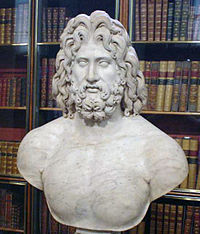 Image via Wikipedia
Image via Wikipedia
There is an article in the latest New York Review of Books on Anthony Grafton and his latest book "Worlds Made by Words: Scholarship and Community in the Modern West" reviewed by G. W. Bowersock. Towards the end of the article there are some amusing notes on Grafton's suspicion of Google and online texts. What I miss about the communities of scholarship in the online world vs. the face-to-face is that if one challenged someone's thinking real-time they came back the next week with research, essays, or evidence and called you on to the carpet. Today they just drop you from Twitter! We read the work of a professional scholar like Grafton's born in full armor like Athena from the forehead of Zeus. This is lovely of course, but I would also like to read Grafton's letters and notes as well. I would have also liked to have participated in the broader understanding of that work as it evolved. I can't do that yet with him, but I can with writers like George Seimens or Stephen Downes because their work is being created in the new "Respublica Litterarum" of the internet. I will call this the "Respublica Digitarum" or the "Respublica Digitara." The internet and the blogosphere is the new coffee house of the 18th century, the "penny university."
Bowersock waxes nostalgiac about the old libraries and books. I don't see it that way. He sees a beutiful old library; I see knowledge siloed away in an inaccessible ivory tower of privilege. I too love old books and value the feel of original sources. But that world is only for the select few and knowledge dribbles out of that silo very slowly. I am glad classical literature is moving online in places like the Perseus Digital Library. Not only do I not have access to these documents elsewhere but neither does the collective intelligence of the internet, or that highly gifted young person with original ideas and fresh enthusiasm (but little money or connections for education at Harvard).
George Seimens asks in Teaching as Transparent Learning about the connection between community, learning and teaching and how interrelated the activities might be. It is in direct contrast to the spirit of Grafton's work. The "Republic of Letters" is the same cacophonous bazaar of ideas that is the "Digital Republic" but much slower. Ideas like this that connect the various traditions are an important context to our intellectual history because they provide a vital context that shows that these ideas are part of a long tradition of research, study, and communication. It is unfair of scholars like Bowsock or Grafton to compare the on-going seminar of the blogs to a closed and finished traditional journal article. Blog entries are always seen as questions, open statements, works in progress, not ends in themselves. Blogs are important because they are somewhat more durable than email or discussion board postings. Electronic books (where some of this wisdom is collected) are going to
 Image via Wikipedia
Image via Wikipedia
In another posting from George Seimens on New Criteria for a New Media the idea of blogging as part of a scholar's academic publishing is brought up. I think if someone gets academic credit for a 225 word note on the use of the passive paraphrastic in the poems of Callimachus in an issue of Modern Philology then scholars and teachers who are constantly engaging and challenging others in their field in new ways via social media should also get some recognition. "As the reports from the American Council of Learned Societies, the Modern Language Association, and the University of Maine recommend, promotion and tenure guidelines must be revised to encourage the creative and innovative use of technology if universities are to remain competitive in the 21st century." I read all of this together in the same afternoon and it is amazing how it all works together. On one hand you have a traditional scholar who isn't quite sure about all this "new" technology and on the other you have the new scholars trying to make sense of where there work fits into that stream.
No comments:
Post a Comment